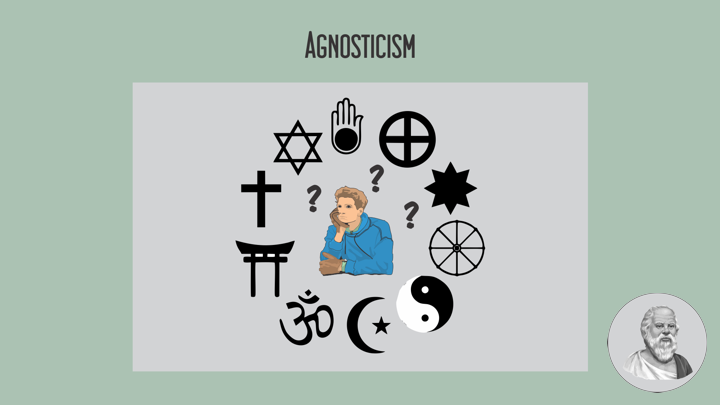——
#Spirituality #Philosophy #Agnosticism #WorkLifeBalance
——
——
Agnosticism
Agnosticism is the view or belief that the existence of God, of the divine or the Supernatural is unknown or unknowable. It can be categorized as an indifference or absence of firm beliefs in Theistic religions and Atheism on that basis. Another definition provided is the view that human reason is incapable of providing sufficient rational grounds to justify either the belief that God exists or the belief that God does not exist.
Agnosticism is the philosophical view that the truth value of certain claims, particularly theological claims regarding metaphysics, afterlife or the existence of God, God’s, Deities, is unknown or possibly inherently unknowable. Some agnostics take a stronger view that the concept of a deity is incoherent, thus meaningless and irrelevant to life. The term is used to describe those who are unconvinced or noncommittal about the existence of deities as well as about other matters of religion. Early Christian church leaders used the Greek word gnosis knowledge to describe Spiritual Knowledge. Agnostic came from the union of it to the Greek / Latin prefix a, and was originally coined by Thomas Henry Huxley in 1869 to describe his philosophy. Agnosticism is not to be confused with religious views opposing the doctrine of gnosis and Gnosticism, these are religious concepts that are not generally related to agnosticism.
Agnostics claim that either it is not possible to have absolute or certain knowledge that while certainty may be possible, they personally have no knowledge. Agnosticism in both cases involves some form of skepticism. Data collection services often display the common use of the term, distinct from atheism in its lack of disputing the existence of deities.
An agnostic is a person who has entertained the proposition that there is a God but believes neither that it is true nor that it is false. Not surprisingly, then, the term agnosticism is often defined, both in and outside of philosophy, not as a principle or any other sort of proposition but instead as the psychological state of being an agnostic. Call this the psychological sense of the term. It is certainly useful to have a term to refer to people who are neither theists nor atheists, but philosophers might wish that some other term besides agnostic theological skeptic were used.
Luc Paquin

